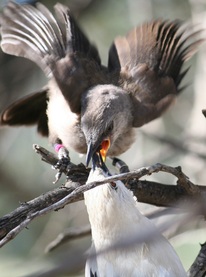Current ResearchCurrent collaborative work
I am currently working in collaboration with Sabrina Engesser (University of Zurich) that extends on some of my PhD work on fledgling begging. This work is focusing on understanding the importance of context in different begging calls used by pied babbler fledglings and the evolutionary processes that have led to these signals. I have been working with Dr Tom Flower (University of Cape Town) on various questions surrounding fork-tailed drongos. This work has been down two main avenues of investigation: firstly, trying to disentangle the tactics used by drongos in kleptoparasitic alarm call use and how they learn these tactics; and secondly, exploring the social interactions between drongos and sociable weavers, a host species that they steal food from. Other work has been investigating the life-history consequences of variation in brain cavity size with Dr Corina Logan and UC Santa Barbara. This work is using the long-term study population of red deer on the Isle of Rum. PhD Thesis Fledgling dependence in a cooperatively breeding bird, Turdoides bicolor My PhD thesis is focuing on the adult-offspring interaction in the post-fledging phase of the pied babbler (Turdoides bicolor). Pied babblers are a terrestrially foraging, sexually monomorphic, cooperatively breeding passerine. The birds in the study population (founded and run by Dr Amanda Ridley) are fully habituated and individually identifiable, enabling me to investigate a phase of development that is very difficult to study in most bird species. The main area of my research is to investigate how fledging changes the conflict between care-givers and offspring over provisioning. The environment that fledglings find themselves in is drastically different to that of nestlings, with different levels or predation risk and competition. The scope for information exchange between adults and offspring is also greater, with information being exchanged constantly rather than restricted to provisioning events. I am therefore interested to see how the begging system of pied babbler fledglings is adapted to this environment and what other signals fledglings might use to extract resources from adults. Field site Kuruman River Reserve, Northern Cape, South Africa Supervisors Prof. Phil Hockey, UCT Dr. Nichola Raihani |
Other areas of interest
Social learning and cognition
I am interested in how sociality enables the transmission of information and the role natural selection plays in the evolution of cognition. Many species live in large complex social groups, providing multiple opportunties for information exchange (either via teaching or observation social learning). The complexity of these societies may provide an environment in which a higher cognitive ability confers a selective advantage.
Interspecific interactions
No species inhabits the world in isolation and the complex interactions between species are a major part of all ecosystem. The interactions that I am interested in range from brood parasitism to the complexities of interspecific information exchange. Elucidating these complex interactions will enable us to determine how animal communities interact and how future biodiversity loss may have unforseen consequences.
Human impact on behavioural ecology
Urban areas are expanding globally and many species are taking advantage of these new habitats. However, the urban and rural environments differ drastically in terms of predator risk, food availability and quality, and density of conspecifics. I am interested in how moving to these environments changes the costs and benefits of various behaviours and thus the behavioural ecology of species. This area of research crosses the boundaries of behavioural ecology, conservation and urban planning.
Human behavioural ecology
I am interested in the many ways that humans adjust their behaviour in response to changes in the cost and benefits that their environment places on them. I am particularly interested in strategic cheating in sport, where the costs and benefits are constantly in flux and the outcome of these behaviours can have major consequences on the outcome of matches.
I am interested in how sociality enables the transmission of information and the role natural selection plays in the evolution of cognition. Many species live in large complex social groups, providing multiple opportunties for information exchange (either via teaching or observation social learning). The complexity of these societies may provide an environment in which a higher cognitive ability confers a selective advantage.
Interspecific interactions
No species inhabits the world in isolation and the complex interactions between species are a major part of all ecosystem. The interactions that I am interested in range from brood parasitism to the complexities of interspecific information exchange. Elucidating these complex interactions will enable us to determine how animal communities interact and how future biodiversity loss may have unforseen consequences.
Human impact on behavioural ecology
Urban areas are expanding globally and many species are taking advantage of these new habitats. However, the urban and rural environments differ drastically in terms of predator risk, food availability and quality, and density of conspecifics. I am interested in how moving to these environments changes the costs and benefits of various behaviours and thus the behavioural ecology of species. This area of research crosses the boundaries of behavioural ecology, conservation and urban planning.
Human behavioural ecology
I am interested in the many ways that humans adjust their behaviour in response to changes in the cost and benefits that their environment places on them. I am particularly interested in strategic cheating in sport, where the costs and benefits are constantly in flux and the outcome of these behaviours can have major consequences on the outcome of matches.

